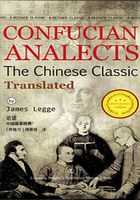
CHAPTER 11
Someone asked the meaning of the great sacrifice. The Master said, "I do not know. He who knew its meaning would
9. THE DECAY OF THE MONUMENTS OF ANTIQUITY. Of Hea an Yin, see II.23. In the small state of Ke (originally what is now the district of the same name in K'ae-fung dep. In Ho-nan, but in Conf. time a part of Shan-tung), the sacrifices to the emperors of the Hea dynasty were maintained by their descendants. So with the Yin dynasty and Sung, a part of the present Ho-nan. But the 文, 'literary monuments' of those countries, and their 献(=贤, so in the Shooking, v.vii.5, et al.) 'wise men' had become few. Had Conf. therefore delivered all his knowledge about the two dynasties, he would have exposed his truthfulness to suspicion, 征, in the sense of 证, 'to witness', and, at the end, 'to appeal to for evidence'. The old comm., however take 征 in the sense of 成, 'to complete', and interpret the whole differently.—We see from the chapter how in the time of Confucius many of the records of antiquity had perished.
10. THE SAGE'S DISSATISFACTION AT THE WANT OF PROPRIETY OF AND IN CEREMONIES. 禘 is the name belonging to different sacrifices, but here indicating the 大祭, 'great sacrifice', which could properly be celebrated only by the Emperor. The individual sacrificed to in it was the remotest ancestor for whom the founder of the reigning dynasty traced his descent. As to who were his assessors in the sacrifices and how often it was offered;—these are disputed points. See K'ang-he's dict. char. 禘. Comp. also 四书改错, VII.8, and 四书摭余说, I.13. An imperial rite, its use in Loo was wrong (see next ch.), but there was something in the service after the early act of libation inviting the descent of the spirits, which more particularly moved the anger of Conf. 而往=以后, diff. from 往 in I.15.
11. THE PROFOUND MEANING OF THE GREAT SACRIFICE. This ch. is akin to II.21. Conf. evades replying to this questioner, it being contrary to Chinese propriety to speak in a country of the faults of its government of rulers. If he had entered into an account of the 禘 sacrifice, he must have condemned the use of an imperial rite in Loo. 说 'explanation'=meaning. The antecedent to the second 其 is the whole of the preceding clause:—'The relation to the empire of him who knew its meaning;—that would be as to look on this'. 乎, interjective, more than interrogative. 示=视, 'to see'. 天下, 'under heaven', an ambitious designation for the Chinese expire, as orbit was used by the Greeks and Romans.

find it as easy to govern the empire as to look on this;"—pointing to his palm.